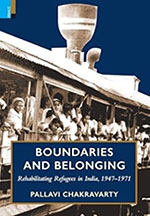Boundaries and Belonging: Rehabilitating Refugees in India, 1947-1971 by Pallavi Chakravarty provides a critical analysis of the Indian state’s post-Partition programmes for rehabilitating refugees. By extensively incorporating archival sources and employing a comparative analytical approach,Chakravarty examines the rehabilitation strategies implemented by the government for refugees coming from East and West Pakistan. She specifically concentrates on two prominent cities in post-Partition India—Delhi and Kolkata. Chakravarty investigates the challenges faced by women refugees, the indifference shown towards Harijan refugees, and the extent to which state-defined stereotypes influenced the efforts of refugees in reconstructing their lives along India’s eastern and western borders. How the state prioritizes determining its constituents becomes an important part of providing relief and rehabilitation by focusing on who should be included in the nation and who should not.

In the Aftermath of Partition: How the Nation-State Determines its Constituents
Mohammad Imtiyaz
BOUNDARIES AND BELONGING: REHABILITATING REFUGEES IN INDIA, 1947-1971 by By Pallavi Chakravarty Primus Books, 2022, 430 pp., INR 1650.00
May 2024, volume 48, No 5
